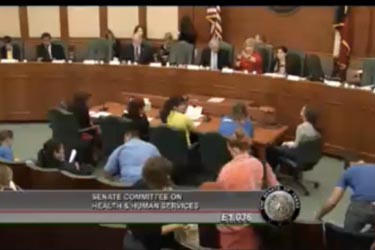‘What Kind of Abortions Are We Willing to Let Texas Women Have?’: An Expert’s Testimony Against SB 1
As Whole Women's Health CEO Amy Hagstrom Miller told the state Health and Human Services Committee at the special senate hearing Monday, the ambulatory surgical center requirements put forth in SB 1 are "unnecessary and completely unrelated to patient safety."

The following is invited testimony on Texas’ SB 1, as given by Whole Women’s Health CEO Amy Hagstrom Miller to the state Health and Human Services Committee at the special senate hearing Monday.
Read more of Rewire‘s coverage of the recent reproductive rights battles in Texas here.
Madam Chairwoman and honorable committee members,
Thank you for inviting me as an expert witness for the hearing today. I appreciate the opportunity to lend my expertise to the committee, and I invite your questions. My name is Amy Hagstrom Miller, and I oppose these bills. I am the president and CEO of Whole Woman’s Health. We operate five licensed abortion facilities and one ASC [ambulatory surgical center] in the state of Texas.
In my testimony I will address four main issues:
-
There is no safety problem related to abortion care in the state of Texas that this bill is addressing.
-
The existing abortion facility regulations are rigorously enforced and are sufficient to ensure the health and safety of women in Texas.
-
Medication abortion is safely offered in clinic settings and falls completely outside the scope of practice for an ASC.
-
Requiring MDs to have admitting privileges is not equally enforced over other medical specialties, nor is it necessary to ensure the health and safely of Texas women seeking abortion care.
We have over 40 years of safe abortion on record in Texas, and the current regulatory system is more than adequate to ensure women’s health and safety. The ASC requirements put forth in this bill are unnecessary and completely unrelated to patient safety.
Abortion facilities in Texas are licensed, inspected, and highly regulated. We operate safe and professional facilities all over this state, and the ASC requirements will not improve care, but rather reduce access for women in Texas and put more women at risk for later term abortions or for illicit abortions outside the medical community. ASC regulations are primarily related to the physical plant and they do not make abortion any safer. While abortion is ethically, emotionally, and spiritually complex for many people, the fact is that it is medically simple. Abortion is provided by one MD and one nurse, it takes five to ten minutes, it is done under local anesthesia and optional mild sedation. Women get dressed and can walk on their own to the recovery room. There is no incision and an extremely low risk of infection. There is no need medically for the larger OR, the wide hallways, the additional airflow system, the regulated humidity, the locker rooms/showers, and janitor closets. ASCs are simply not needed for safe abortion care.
This bill also puts forward a radical restriction for the abortion pill—a simple set of medications women take to induce miscarriage, usually before there is even a fetus. This bill would require that medication abortion be offered only at a surgical center and that women be required to come in for no less than four face-to-face visits with the physician in order to take the pill. This is totally uncalled for medically. Why would it be in the best interest of Texas women to place any additional restrictions on their access to safe, early abortions? Restrictions on medication abortion should be removed from this bill completely.
Finally, I wish to address the requirement for all MDs providing abortion care to have admitting privileges at a hospital within 30 miles of the ASC. Abortion is one of the safest procedures in medicine—it is [14 times] safer than full-term childbirth and with a complication rate of .05 percent. Abortion providers rarely have transfers to or admissions into hospitals for their patients. The current system we have for abortion facilities in Texas works very well and ensures safety for the women we serve. No other MD providing day surgery at an ASC is required to have admitting privileges—the ophthalmologist, the orthopedist, the gynecologist. The current ASC regulations in force statewide and across specialties requires MD to have privileges or have a transfer agreement with a local hospital. This system is perfectly adequate to care for women seen in ASCs of a variety of surgeries across specialties.
In conclusion, let me remind you that abortion didn’t start with Roe v. Wade; safe abortion started with Roe v. Wade. Women have always had abortions, and Texas women will still need access to abortion if you pass this bill. The issue at hand here is what kind of abortions are we willing to let Texas women have? This bill is specifically crafted to reduce women’s access to abortion in Texas, plain and simple. It does nothing to prevent abortions or prevent unplanned pregnancy. It does nothing to change the need for abortion among Texas women. If these restrictions pass, thousands of women will be without proper care. I strongly oppose the passing of these bills and thank you again for hearing my testimony.

